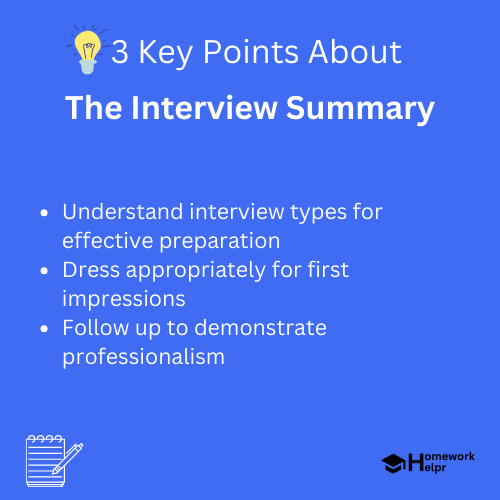📝 Summary
Interviews serve a critical role in job opportunities and educational admissions, requiring a solid understanding of their structure and types. This article covers essential aspects like effective preparation, communication techniques during the interview, and the importance of post-interview follow-ups for impressing interviewers. Key interview types include individual, group, panel, and informational interviews. By following these strategies, candidates enhance their chances of success while building confidence along the way. By practicing and persistently improving, anyone can excel in their interview skills!
The Interview Summary
Interviews are a critical part of the process for many situations, ranging from job opportunities to admissions in educational institutions. Understanding the structure and elements of an interview can significantly enhance one‚’ performance. This article provides a comprehensive summary of the interview process, encompassing its types, preparation techniques, and essential follow-up methods.
Types of Interviews
Interviews can be categorized into various types, each with its specific purpose and format. Familiarizing yourself with these types will help you prepare accordingly for any interview scenario, whether it is for a job or an academic position.
- Individual Interviews: This is the most common type, where a single candidate is interviewed by one or more interviewers. The focus is primarily on the candidate’s qualifications and experiences.
- Group Interviews: These involve multiple candidates being interviewed simultaneously. This type tests the candidates’ abilities to communicate and collaborate with others.
- Panel Interviews: In a panel setup, a candidate is questioned by a group of interviewers representing different aspects of the organization or institution.
- Informational Interviews: These are conducted to gather information about a role, industry, or company rather than for a specific job opening. They are often characterized by a more informal tone.
Definition
Panel Interview: A type of interview where multiple interviewers assess a single candidate simultaneously for diverse perspectives.
Examples
For instance, in a group interview, participants might be asked to solve a problem together, showcasing their teamwork abilities.
Preparing for an Interview
Effective preparation is vital for an impressive interview performance. The following elements are key to ensure you make a strong impression.
- Research the Organization: Understand the mission, values, and recent developments of the organization or institution. This will help you tailor your answers to align with their goals.
- Practice Common Questions: Familiarize yourself with typical interview questions. Practice your responses to ensure you convey your strengths effectively.
- Dress Appropriately: Your attire should be professional and suitable for the context of the interview. First impressions matter!
- Prepare Questions: Having a list of intelligent questions to ask the interviewer shows your interest and engagement in the position.
❓Did You Know?
A study revealed that nearly 60% of hiring managers prefer to see candidates ask insightful questions during the interview.
Definition
Attire: Clothing that is worn for a particular occasion or event.
Examples
For example, if you’re interviewing for a corporate position, a formal suit may be preferred, whereas a tech startup might be more relaxed, allowing for smart casual attire.
During the Interview
How you conduct yourself during an interview significantly influences the outcome. Here are some tips to keep in mind:
- Make Eye Contact: Maintaining eye contact helps to build trust and demonstrates confidence.
- Use Body Language Wisely: Positive body language, such as nodding and open gestures, can illustrate enthusiasm and engagement.
- Listen Actively: Pay attention to the questions being asked and respond thoughtfully. Active listening conveys respect towards the interviewer.
- Be Honest: It‚’ important to be truthful about your experiences and qualifications. This builds your credibility.
Definition
Credibility: The quality of being trusted and believed in, especially in a professional context.
Examples
A candidate who responds honestly about their skills, like admitting they are still learning a specific software, is likely to be viewed as more reliable than someone who exaggerates their abilities.
Post-Interview Follow-Up
After the interview, a follow-up process plays a crucial role. It not only demonstrates your professionalism but also your genuine interest in the position.
- Send a Thank-You Note: Express your gratitude through a thank-you email or note. Mention specific discussions from the interview to personalize it.
- Reflect on Your Performance: Take time to analyze what went well and areas you can improve for future interviews.
- Stay Patient and Positive: Understand that the decision-making process can take time. Remain optimistic and ready for outcomes, whether positive or negative.
Definition
Personalize: To make something distinctive or tailored to a person‚’ specific needs or situation.
Examples
For instance, if you discussed a specific project in the interview, reference it in your thank-you note to show attentiveness.
Conclusion
In conclusion, mastering the interview process involves understanding the various types, thorough preparation, effective communication during the interview, and diligent post-interview practices. By applying these strategies, candidates can increase their chances of making a positive impression and securing the opportunity they desire. Whether you are preparing for an academic interview or a job interview, these insights will guide you towards success!
With practice and persistence, anyone can improve their interview skills. Always remember to be confident, be yourself, and enjoy the learning that comes from each interview experience!

Related Questions on The Interview Summary
What are the different types of interviews?
Answer: Individual, group, panel, and informational interviews.
Why is preparation important for interviews?
Answer: Preparation enhances performance and builds confidence.
What should I do after an interview?
Answer: Send a thank-you note and reflect on your performance.
How can I make a good impression during an interview?
Answer: Maintain eye contact, use positive body language, and listen actively.
